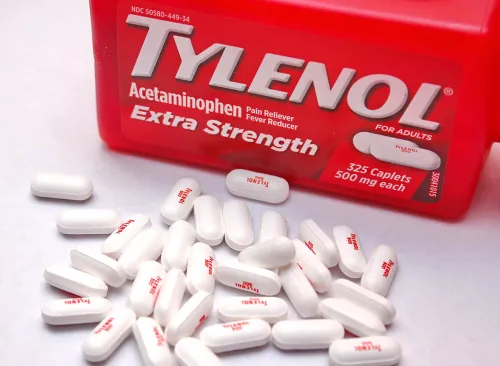
In cases of mild sickness, your pharmacy usually has everything you need to get on the path to wellness. But experts warn that convenience can come with consequences: Some over-the-counter (OTC) drugs that many consumers consider safe can cause a range of adverse effects.
In particular, one popular medication has been linked to roughly half of all cases of acute liver failure in the U.S.—a fact that’s prompting experts to sound the alarm about its safety. Read on to find out which medication doctors say is “the most dangerous OTC drug” in the nation, and how to avoid serious side effects when you take it.
RELATED: Experts Warn This Common Medication May Be Linked to Dementia Risk.
Many doctors consider Tylenol the most dangerous OTC drug.
Generating over a billion dollars in annual sales, Tylenol is one of the most widely sold OTC drugs in the nation. The active ingredient in Tylenol, acetaminophen, is also used in a range of other medications, including many popular decongestants and cough syrups.
However, experts warn that this ubiquitous drug has been linked with just over half of all cases of liver failure in America.
“Taking too much acetaminophen… is the most common cause of acute liver failure in the United States,” explains Mayo Clinic. “Acute liver failure can occur after one very large dose of acetaminophen, or after higher than recommended doses every day for several days.”
Even more alarming, the National Institutes of Health (NIH) reports that “acetaminophen toxicity is the second most common cause of liver transplantation worldwide.”
John Brems, MD, a professor of surgery at Loyola University in Chicago who treats patients with acute liver poisoning, recently shared his own warning on the matter.
“Acetaminophen is a dangerous drug,” he told ABC News, via Drug Watch. “It is probably the most dangerous OTC drug in this country.”
RELATED: The No. 1 Supplement Causing Dangerous Liver Damage, Doctors Warn.
Tylenol overdoses are more common than you think.

While you may have already been aware of Tylenol’s risk of adverse effects, you might still be surprised to learn how consequential those risks can be.
According to the NIH, acetaminophen poisoning is responsible for 56,000 emergency department visits, 2,600 hospitalizations, and 500 deaths each year in the U.S. Half of these poisonings are accidental.
In 2004, a team of researchers found similarly disturbing data on acetaminophen poisoning, even though Tylenol is “heavily marketed for its safety.”
“By enabling self-diagnosis and treatment of minor aches and pains, its benefits are said by the Food and Drug Administration to outweigh its risks,” the team wrote. “It still must be asked: Is this amount of injury and death really acceptable for an over-the-counter pain reliever?”
Symptoms of having taken too much acetaminophen include nausea, vomiting, loss of appetite, sweating, fatigue, jaundice in the skin or eyes, upper-right quadrant abdominal pain, and flu-like symptoms.
RELATED: These Common Meds May Be Helping COVID Spread in Your Body, Scientists Say.
Tylenol can be especially dangerous if you’re over 65 or have heart issues.
As Best Life recently reported, a study published in the journal Arthritis Care and Research looked at the effect of oral acetaminophen doses in people 65 and older.
Those who took Tylenol repeatedly for conditions such as chronic pain or osteoarthritis had an increased risk of peptic ulcers, heart failure, hypertension, and chronic kidney disease.
In speaking with Fox News Digital about the study, Marc Siegel, MD, clinical professor of medicine at NYU Langone Health and senior medical analyst at Fox News (who was not involved in the study), pointed out that the research challenges the common belief that only ibuprofen causes gastrointestinal problems.
“It is generally accepted doctrine that acetaminophen is not associated with GI bleeding or advancing kidney disease, but the thinking is starting to change on this front,” he said.
Additionally, a 2022 study published in the journal Circulation found that regular use of acetaminophen can raise the blood pressure of those who already have hypertension, regardless of age.
RELATED: If You’re Over 60, These 6 OTC Medications Could Be Dangerous, Doctors Say.
Other ways you’re at a high risk of an adverse reaction:
All medications have the potential to cause harm when they are misused, but certain factors put you at heightened risk of a problem.
Experts say your chances of having an adverse reaction to Tylenol increase if you take more than the recommended dosage, mix it with other medications, which could cause drug interactions, are allergic to any of its ingredients, or take it with alcohol.
For example, if someone unknowingly takes both Tylenol and a multi-symptom cold medicine such as NyQuil, they’re effectively doubling the safe dose of acetaminophen, putting them at risk of accidental overdose.
Brems noted that in his experience, mixing Tylenol with alcohol is the most common cause of a life-threatening reaction. “Many of these patients took acetaminophen in addition to alcohol. I end up transplanting three to four patients per year, and two to three die before we can transplant them,” he told ABC News.
It’s always a good idea to speak with your doctor before you begin any new medical regimen, even if the drugs you plan to take are available without a prescription.
Source link

